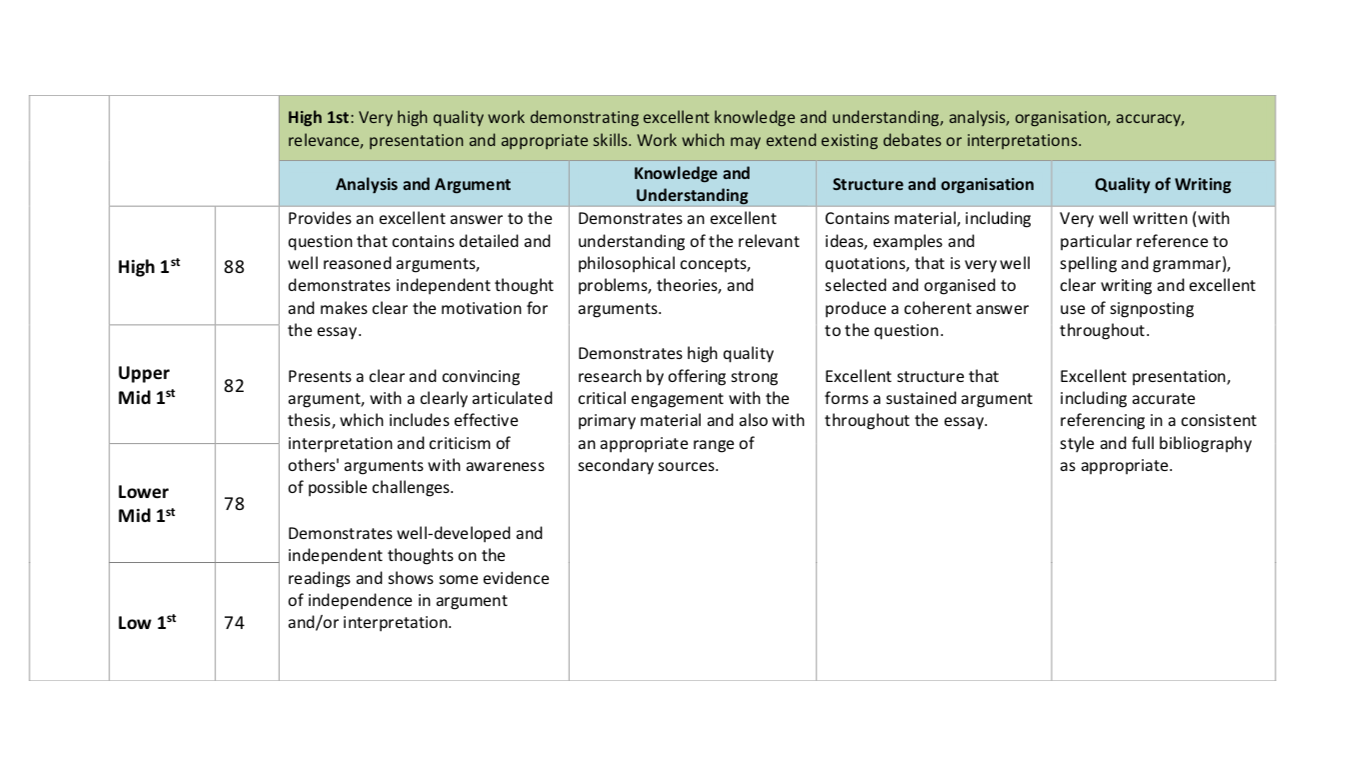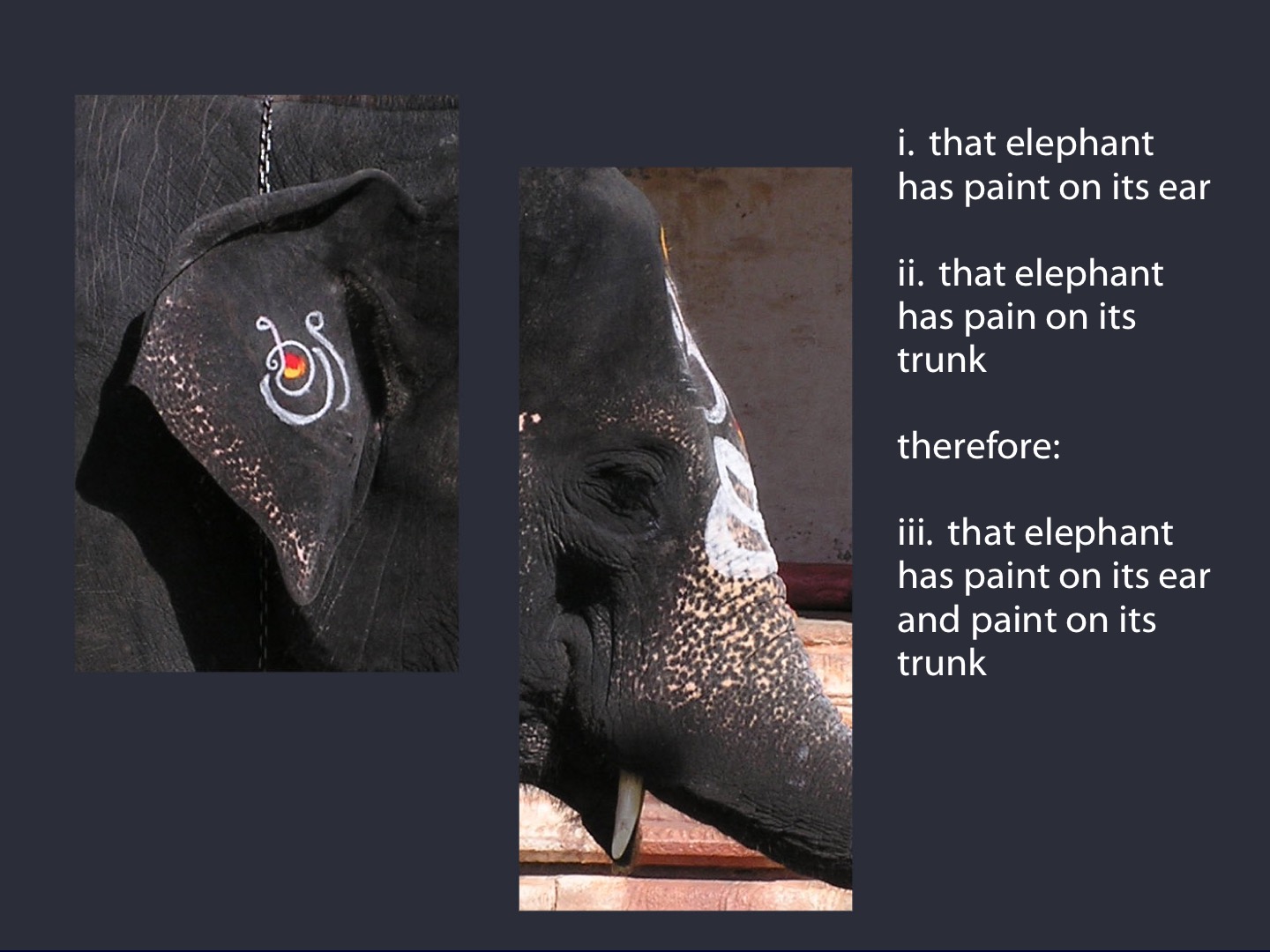Click here and press the right key for the next slide (or swipe left)
(This may not work on mobile or ipad. You can try using chrome or firefox, but even that may fail. Sorry.)
(If the slides don’t work, you can still use any direct links to recordings.)
also ...
Press the left key to go backwards (or swipe right)
Press n to toggle whether notes are shown (or add '?notes' to the url before the #)
Press m or double tap to slide thumbnails (menu)
Press ? at any time to show the keyboard shortcuts
Lecture 17:
Mind & Reality
\def \ititle {Lecture 17}
\def \isubtitle {Mind & Reality}
\begin{center}
{\Large
\textbf{\ititle}: \isubtitle
}
\iemail %
\end{center}
How to Revise: General Tips
\section{How to Revise: General Tips}
\emph{Reading:} §Philosophy Marking Criteria, https://warwick.ac.uk/fac/soc/philosophy/intranets/undergraduate/exams_essays/marking_scheme
1. revision in general
2. on assessments
3. specific topics
Will cover specific topics in the next section
How to revise?
You’ve only done half the work of learning.
The second half is (i) consolidate; (ii) integrate; and (iii) extend.
How much of the work of learning have you done?
consolidate,
integrate; and
extend
You notice that I'm not saying memorize
enjoy revising, by being selective
\section{How to Do the Assessment}
\emph{Reading:} §Philosophy Marking Criteria, https://warwick.ac.uk/fac/soc/philosophy/intranets/undergraduate/exams_essays/marking_scheme
1. revision in general
2. on assessments
3. specific topics

Answer the question.
Some questions are easier than others:
harder to fail, harder to excel.
Don’t expect high marks for easy answers.
Use the philosophy marking criteria.
It’s not about you (nor me).
Can I write on the same topic as before? Yes!
Can I cut and paste from my earlier essay?
Not if it was assessed.
How to Revise: the Topics
\section{How to Revise: the Topics}
\emph{Reading:} §Sainsbury, R. M. ‘Russell on Acquaintance’. Royal Institute of Philosophy Supplements 20 (March 1986): 219–44. https://doi.org/10.1017/S0957042X00004156., §Shoemaker, David. ‘Personal Identity and Ethics’. In The Stanford Encyclopedia of Philosophy, edited by Edward N. Zalta, Winter 2019. Metaphysics Research Lab, Stanford University, 2019. https://plato.stanford.edu/archives/win2019/entries/identity-ethics/., §Martín, Andrés, Javier Chambeaud, and José Barraza. ‘The Effect of Object Familiarity on the Perception of Motion’. Journal of Experimental Psychology: Human Perception and Performance 41, no. 2 (April 2015): 283–88. https://doi.org/10.1037/xhp0000027., §Parfit, D. (1984). Reasons and Persons. Clarendon Press, Oxford., §Buchanan, Allen. ‘Advance Directives and the Personal Identity Problem’. Philosophy & Public Affairs 17, no. 4 (1988): 277–302.
1. in general
2. on assessments
3. specific topics
One and two covered in previous section
We have these 7 topics. Don't revise them all. Just your favourites.
| topic | question |
| Acquaintance | How do your thoughts connect to the things about which you think? |
| Cognitive Penetration | How, if at all, do your thoughts influence your perceptions? |
| Awareness | What good is your perceptual awareness of the objects around you? |
| Sense & Reference | Why are some numerical identities informative? |
| Metaphysics | What is necessary for your personal survival? |
| Action | Of the events involving you, what determines which are your actions? |
| Induction | What is it for an observation to provide evidence for a scientific theory? |
‘If objects can come before the mind only under some concept or mode of presentation, then Russell's notion of acquaintance as a non-conceptual form of awareness is wrong.
The criticism shows that, if acquaintance is non-conceptual, whatever mental modification is required for a subject to become acquainted with an object does not add up to the mental modification required for a subject to come to have a thought of which that object is a constituent.’
Sainsbury, 1986 p. 231--2
Quite a lot to do here. What are concepts? What is nonconceptual?
| topic | question |
| Acquaintance | How do your thoughts connect to the things about which you think? |
| Cognitive Penetration | How, if at all, do your thoughts influence your perceptions? |
| Awareness | What good is your perceptual awareness of the objects around you? |
| Sense & Reference | Why are some numerical identities informative? |
| Metaphysics | What is necessary for your personal survival? |
| Action | Of the events involving you, what determines which are your actions? |
| Induction | What is it for an observation to provide evidence for a scientific theory? |
Richard doesn’t say how it ends.
It could be one of those ‘I like Trains’ moments.
But I perfer a happy ending.
| topic | question |
| Acquaintance | How do your thoughts connect to the things about which you think? |
| Cognitive Penetration | How, if at all, do your thoughts influence your perceptions? |
| Awareness | What good is your perceptual awareness of the objects around you? |
| Sense & Reference | Why are some numerical identities informative? |
| Metaphysics | What is necessary for your personal survival? |
| Action | Of the events involving you, what determines which are your actions? |
| Induction | What is it for an observation to provide evidence for a scientific theory? |
connection to action (later will argue that awareness plays a role in
linking distinct motivational systems)
| topic | question |
| Acquaintance | How do your thoughts connect to the things about which you think? |
| Cognitive Penetration | How, if at all, do your thoughts influence your perceptions? |
| Awareness | What good is your perceptual awareness of the objects around you? |
| Sense & Reference | Why are some numerical identities informative? |
| Metaphysics | What is necessary for your personal survival? |
| Action | Of the events involving you, what determines which are your actions? |
| Induction | What is it for an observation to provide evidence for a scientific theory? |
I’m going to come to this in another section
| topic | question |
| Acquaintance | How do your thoughts connect to the things about which you think? |
| Cognitive Penetration | How, if at all, do your thoughts influence your perceptions? |
| Awareness | What good is your perceptual awareness of the objects around you? |
| Sense & Reference | Why are some numerical identities informative? |
| Metaphysics | What is necessary for your personal survival? |
| Action | Of the events involving you, what determines which are your actions? |
| Induction | What is it for an observation to provide evidence for a scientific theory? |
Connection back to sense and reference:
there we thought about the nature of mental states.
Can this help us to explain what psychological contintuity require?
Can investigate further using SEP as a starting point ...
Connection back to awareness: (from a question in the live sessions):
does awareness matter for psychological continuity?
(Different topic: self-awareness rather than perceptual awareness;
same approcah=get an inittial handle on the notion of awreness by askng what it is good for.)
Shoemaker, ‘Personal Identity and Ethics’.
In The Stanford Encyclopedia of Philosophy
Ok, so I'm reearching this ... I really ought to look at the section on
Pscyhological Continuity. But wait, what's this? the anthropological view?
I can't resist it! Or IDM? Even better.
Ah yes, here's IDM.
It's based on Parfit's view in Reasons & PErsons.
I love Parfit. I must read more.
Let me go to the bibliography and find the reference.
Here I am in the bibliography and I'm looking for parfit.
Be disciplined STeve, stay on focus.
But there's so much good stuff here ...
Oooh, how curious, there's an article in a public affairs journal.
What could that be about? Let's just take a quick look.
Oh yes, google scholar and I'm right in it.
Now what was I doing here again?
I've forgotton exactly my objective.
But that's ok.
How focussed should my revision be?
ALthough some of your revision should be highly focussed,
it's actually good, in the early stages, to flutter around like a butterfly in the breeze.
Pexels Videos 1510138
| topic | question |
| Acquaintance | How do your thoughts connect to the things about which you think? |
| Cognitive Penetration | How, if at all, do your thoughts influence your perceptions? |
| Awareness | What good is your perceptual awareness of the objects around you? |
| Sense & Reference | Why are some numerical identities informative? |
| Metaphysics | What is necessary for your personal survival? |
| Action | Of the events involving you, what determines which are your actions? |
| Induction | What is it for an observation to provide evidence for a scientific theory? |
| topic | question |
| Acquaintance | How do your thoughts connect to the things about which you think? |
| Cognitive Penetration | How, if at all, do your thoughts influence your perceptions? |
| Awareness | What good is your perceptual awareness of the objects around you? |
| Sense & Reference | Why are some numerical identities informative? |
| Metaphysics | What is necessary for your personal survival? |
| Action | Of the events involving you, what determines which are your actions? |
| Induction | What is it for an observation to provide evidence for a scientific theory? |
Explore the connection here.
Is there really a problem if there is cognitive penetration?
There's also an awful lot more to read on this topic.
| topic | question |
| Acquaintance | How do your thoughts connect to the things about which you think? |
| Cognitive Penetration | How, if at all, do your thoughts influence your perceptions? |
| Awareness | What good is your perceptual awareness of the objects around you? |
| Sense & Reference | Why are some numerical identities informative? |
| Metaphysics | What is necessary for your personal survival? |
| Action | Of the events involving you, what determines which are your actions? |
| Induction | What is it for an observation to provide evidence for a scientific theory? |
Reconstructing Arguments for Distinguishing Sense and Reference
\section{Reconstructing Arguments for Distinguishing Sense and Reference}
1. [premise] Lois thinks that Superman can fly but does not thinks that Clark can fly
Therefore:
2. The thought that Superman can fly is not the same as the thought that Clark can fly [from 2]
3. [premise] Clark and Superman are the same object
4. Both thoughts refer to the same object [from 3]
5. Reference cannot be what distinguishes the two thoughts [from 4]
6. [premise] There is attribute of the two thoughts which distinguishes them
7. [stipulation] Let sense be the name of that attribute.
Therefore:
8. The two thoughts do not involve the same senses [from 5 & 7]
Therefore:
9. Sense and reference are distinct notions [from 4 & 8]
It’s pretty complex. YOu need to take time to go through this yourself.
One last thought ...
Other bases for arguments
Statements of the form a=a and a=b can differ in informativeness, and can do so in a way that cannot be explained by information just about names.
We can coherently use names for things which do not exist, and even make informative discoveries using such names.
Tooth Fairy does not exist; nor does Easter Bunny.
Indexicals and Demonstratives
\section{Indexicals and Demonstratives}
\emph{Reading:} §Russell, B. (1910). Knowledge by Acquaintance and Knowledge by Description. Proceedings of the Aristotelian Society, 11:108–128, §Campbell, J. (2002). Reference and Consciousness. Oxford: OUP, §Perry, J. (1979). The problem of the essential indexical. Nous, 13(1):3–21., §Kaplan, D. (1989). Demonstratives. In Almog, J., Perry, J., and Wettstein, H., editors, Themes from Kaplan. Oxford University Press, Oxford.
names vs indexicals-and-demonstratives
[me:] Descartes is a sceptic.
[you:] Descartes is not a sceptic.
An indexicals or demonstrative is an expression whose referent depends on an aspect of the context of utterance.
‘I’ refers to the utterer
‘now’ refers to the time of utterance
[me:] I am a sceptic.
[you:] I am not a sceptic.
[me:] That is a good argument.
[you:] That is not a good argument.
Example 1: “A bear is about to attack me”
“When you and I entertain the [thought we might each express by saying] "A bear is about to attack me," we behave similarly. We both roll up in a ball and try to be as still as possible …
“When you and I both apprehend the thought that I am about to be attacked by a bear, we behave differently. I roll up in a ball, you run to get help.”
Perry, 1977 p. 494
Example 2: “A bear is about to attack me”
contrast: ‘A bear is about to attack Steve’
The sense of ‘I’ cannot be the sense of ‘Steve’.
application 1
the mystery of sense

Just to say that we have Frege-like puzzles involving only demonstrative thoughts.
If Frege is right that we need to postulate sense (not just reference) in order to characterise points of view,
then we need to postulate sense not just for names but also for indexicals and demonstratives.
application 2
the argument from massive reduplication
Some people wanted to use descriptions like ‘The book nearest to me’
1. [premise] Suppose you were not acquainted with anything.
2. Then all your thoughts would be based on knowledge by description. [from 1]
3. [premise] Massive reduplication is possible for all we know.
4. Therefore: you might not ever be thinking about anything, for all we know. [from 2 & 3]
5. [premise] But we do know that you sometimes succeed in thinking about some things.
6. Therefore you are acquainted with at least one thing. [from 1, 4 & 5]
The book nearest to me is on fire
‘Whenever the relation of supposing or judging occurs, the terms to which the suppossing or judging mind is [thereby] related by the relation of supposing or judging must be terms which the mind in question acquainted.’
Russell, 1910 p. 118
Some people wanted to use descriptions like ‘The book nearest to me’
1. [premise] Suppose you were not acquainted with anything.
2. Then all your thoughts would be based on knowledge by description. [from 1]
3. [premise] Massive reduplication is possible for all we know.
4. Therefore: you might not ever be thinking about anything, for all we know. [from 2 & 3]
5. [premise] But we do know that you sometimes succeed in thinking about some things.
6. Therefore you are acquainted with at least one thing. [from 1, 4 & 5]
Understanding points of view
means understanding indexical and demonstrative thoughts.



